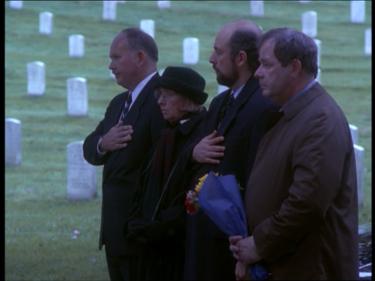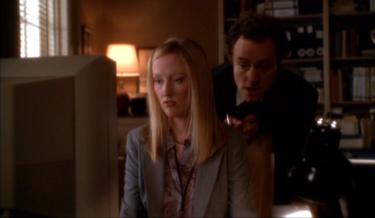Did a Perceived Slight at the Emmys Set Off a Chain of Events That Would Lead to a West Wing Story?
Here is the latest in a series of examinations into urban legends about TV and whether they are true or false. Click here to view an archive of the TV urban legends featured so far.
TV URBAN LEGEND: A perceived slight at an awards ceremony after Season 1 of the West Wing set off a chain of events that ended up with a plotline in a Season 3 episode.
After the first season of the West Wing, the show was rewarded with a plethora of Emmy Awards, including Best Supporting Actor, Best Supporting Actress, Best Drama and Best Writing for a Drama Series.
The writing award was given to writers Aaron Sorkin (creator of the West Wing) and Rick Cleveland for the Season 1 episode “In Excelsis Deo,” which is about staff member Toby Ziegler (played by Richard Schiff, who nabbed an Emmy that year for Best Supporting Actor) trying to secure a burial at Arlington for a homeless veteran of the Korean War.

Now, during the awards ceremony, Sorkin was the only one to speak. That event led to quite a bit of a stir eventually.
A little bit later, Cleveland wrote an editorial where he complained about feeling as though he was basically ignored by Sorkin (Cleveland had also been let go from the West Wing at the end of Season 1). Cleveland wrote:
You might not remember me from that night. I was the guy wearing the little wire-framed glasses, standing directly behind Aaron Sorkin. I had a dumbfounded smirk on my face, and I imagine I must’ve looked a little like a member of Sorkin’s security detail. When he was done speaking, he kind of ushered me offstage with him, and, dumbly, I followed.
Backstage, at the table where they ask you to sign your name in the book so you can take your Emmy home with you, Sorkin was standing, busy watching [director, co-executive producer] Tommy Schlamme’s acceptance speech on one of the monitors. The nice lady behind the table looked at me and said, “Mr. Sorkin is going to have to sign for his Emmy.” I realized at that moment that she must have thought that I was Sorkin’s publicist or assistant. I looked at her kind of sheepishly and said, “Aren’t we supposed to get two of them?” She looked at her book and saw the second name in that category–my name. She looked back up at me and said, “Is Mr. Cleveland here this evening?”
Sorkin had been hanging out a little bit at a television website called MightyBigTV (which was very soon going to change its name to TelevisionWithoutPity) and on the West Wing message boards, someone asked about Cleveland’s piece.
Sorkin explained that Cleveland wrote a draft of an episode, but Sorkin found it quite wanting and then just rewrote it entirely and then gave Cleveland a co-writer credit as a courtesy. Sorkin then added that that was basically the same thing with ALL of the scripts from the first season of West Wing that had co-writer credits – they were there because Sorkin wanted to give each of the various writers a sort of token of his appreciation.
Well, naturally, Cleveland showed up on the message boards as well, and he and Sorkin went back and forth (Cleveland’s biggest point of contention was that he had a lot more to do with the episode than Sorkin admitted, primarily the fact that Cleveland’s FATHER was a Korean War veteran who died a homeless alcholic so that part of the episode was directly from Cleveland’s own life, but Cleveland also challenged the assertion that his name was on the script by Sorkin’s good will – Cleveland asserted that the script, like all other West Wing scripts, went to the Writers Guild of America for arbitration and he had been officially awarded a co-writer credit).
In the end, the two were on fine terms with each other, but by then, the mainstream media had picked up on it and, as is their wont, made it a much bigger deal than it was initially (and also painted the message board as a West Wing fan site, when it was a general TV site that just happened to have a message board for West Wing discussion). Sorkin claims that he is now basically “not allowed” to post on the board anymore.
Later on, though, during Season Three of the series, Sorkin got into another fracas of sorts on TelevisionWithoutPity (TWOP) over discussions about whether his work had some sexism mixed in there. Sorkin, naturally, felt that his work was not sexist at all and he was quite upset at the assertion that it did, so he took out his anger on some posters on the boards there.
And then “The U.S. Poet Laureate” happened.
A Season Three episode written by Sorkin, the episode has a sub plot where Josh Lyman (played by Bradley Whitford) discovers that there is a website out there devoted to him. When he stops by there, though, he also discovers that there are some views of him that he takes issue with. He gets sucked into it (and even drags his assistant Donna into it).

Then we basically get the whole situation from Sorkin’s perspective, including Josh/Sorkin ultimately being told to stay away from the message boards.
Sorkin basically did, although he did make a return of sorts at the end of Season 7, this time in a conciliatory fashion, after the death of John Spencer led to a heartwarming outpouring of condolences from posters at the West Wing message boards.
I did not follow Sorkin’s take on message boards for his next series, Studio 60 on the Sunset Strip, but from the depiction of the internet on his current series, The Newsroom (where there is a whole plot where a reporter wants to do an expose on “internet trolls,” I would imagine that his views have not changed much…

The legend is…
STATUS: True
Thanks to Chad for the question!
Feel free (heck, I implore you!) to write in with your suggestions for future urban legends columns! My e-mail address is bcronin@legendsrevealed.com






cool, thank you